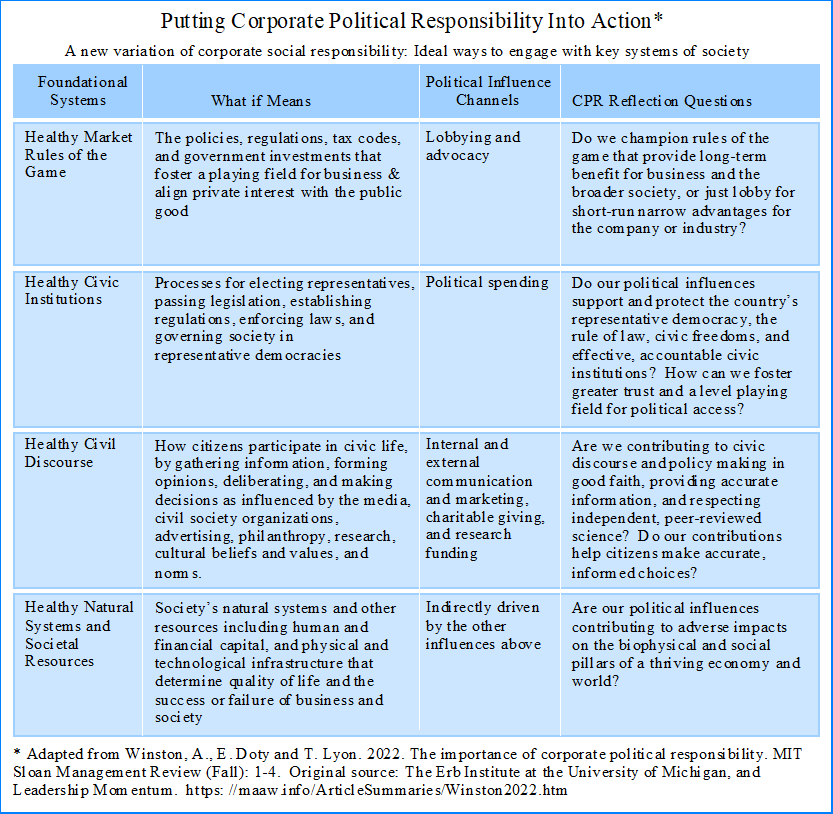
Summary by James R. Martin, Ph.D., CMA
Professor Emeritus, University of South Florida
Social Accounting Main
Page | Political Issues Main
Page | Strategy Main Page
Leaders and their organizations need to move beyond the environmental, social, and governance (ESG) perspective to build a business that thrives by serving the world. They need to use their political influence (political spending, lobbying, advocacy, employee and external communication) to help solve society's biggest challenges. This requires developing a corporate political responsibility framework to guide their decisions about how to engage in political affairs.
Navigating to a New Normal of Political Engagement
It is disingenuous for companies to pretend to be passive observers of legislation, regulations, and the political climate. Political spending, social media, advertising, philanthropy, and public relations can shape beliefs and influence voting and behavior, but navigating the political environment can create problems for companies such as Disney's recent experience with Florida's governor.1 Broad principles and guidelines are needed to gain consistency and responsibility when engaging in political affairs. How can they align their spending with their company values? Which values should they prioritize, and how do they navigate the risk of conflicts with the narrow short-term interests of politicians. A way forward is to take a broader view focused on the larger systems underlying business and humanity.
Working toward Corporate Political Responsibility
A broader systems view focuses on how a business influences four key systems including: the rules of the game, civic institutions and representation, civil society and public discourse, and natural systems and societal shared resources. This systems view or framework is illustrated in the table below. Companies can begin by exploring the questions included in the table, or create their own questions. Based on their reflections on the issues that arise they can prioritize actions that at the very least do no harm.

The systems view of corporate political responsibility involves approaching government as a partner to help the company become a net positive2 business avoiding political contributions and lobbying to gain a narrow advantage at the expense of the public well-being. Critics, watchdogs, and investors can get involved to challenge lawmakers to abide by similar practices to provide support for representative democracy and to build a world that works for everyone.
_________________________________________________
1 Governor DeSantis targeted the special district that allowed Disney to self-govern after Disney voiced opposition to a Florida bill limiting classroom discussion of sexual orientation or gender identity. Disney responded by suing DeSantis for "a relentless campaign to weaponize government power" against the company.
2 The term "net positive" is from Winston, A. and P. Polman. 2021. Net Positive: How Courageous Companies Thrive by Giving More Than They Take. Harvard Business Review Press.
Related summaries:
Estes, R. 1992. Social accounting past and future: Should the profession lead, follow - or just get out of the way? Advances In Management Accounting (1): 97-108. (Note and Summary).
Goldstein, S. 2015. Six capitals, or can accountants save the planet? Rethinking capitalism for the twenty-first century. The CPA Journal (October): 15-16. (Review of Gleeson-White's Book - Note).
Handy, C. 2002. What's a business for? Harvard Business Review (December): 49-55. (Summary).
Jones, A. III. and G. A. Jonas. 2011. Corporate social responsibility reporting: The growing need for input from the accounting profession. The CPA Journal (February): 65-71. (Summary).
Levin, B. and L. Downes. 2022. Every company needs a political strategy today: Five principles will help leaders take decisive action when fast-moving laws and regulations conflict with stakeholder values. MIT Sloan Management Review (Fall): 1-4. (Summary).
Porter, M. E. and M. R. Kramer. 2006. Strategy and society: The link between competitive advantage and corporate social responsibility. Harvard Business Review (December): 78-92. (Summary).
Porter, M. E. and M. R. Kramer. 2011. Creating shared value: How to reinvent capitalism and unleash a wave of innovation and growth. Harvard Business Review (January/February): 62-77. (Summary).
Thomason, B., N. Chawla, A. Gabriel, D. Greenburg, C. Lampert, K. Moergren, D. Sumpter and E. Umphress. 2022. How organizations can take a lead in protecting reproductive rights. MIT Sloan Management Review (Fall): 1-4. (Summary).